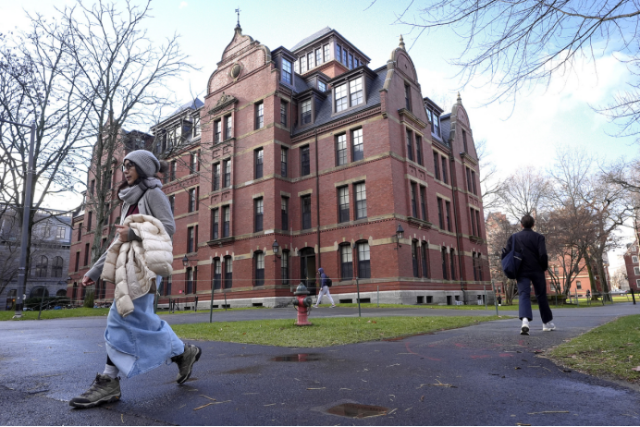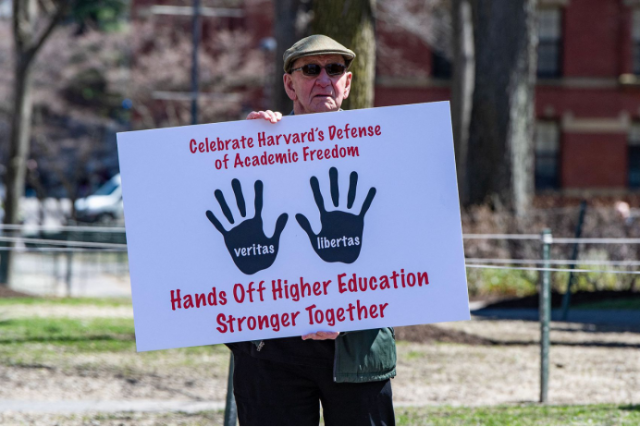On May 22, the Trump administration dealt a seismic blow to Harvard University by revoking its certification to enrol international students under the "Student and Exchange Visitor Program" of the Department of Homeland Security (DHS).
The move, described by DHS Secretary Kristi Noem as a response to Harvard's "failure to adhere to the law," would effectively strip the Ivy League institution of its ability to host over 6,700 international students—27% of its student body. In other words, these students must immediately transfer to another institution or risk losing their legal residency status in the United States.

People walk between buildings, Dec. 17, 2024, on the campus of Harvard University in Cambridge, Massachusetts. (Photo: CFP)
Harvey Dzodin, a former legal adviser in the Carter administration and former director and vice president of ABC Television in New York, warns that the decision leads to a broader crisis. "Cutting off international students shreds the international system. We need a multiplicity of nationalities working together—it's synergistic."
In fact, there has been a feud that goes way back between the president and the school. The order has intrinsically escalated the standoff. In 2024, the Trump administration launched investigations into dozens of U.S. universities, accusing them of fostering antisemitism and "racist" diversity, equity, and inclusion (DEI) practices.
Harvard, a frequent target, faced demands to disclose records of international students involved in protests related to the Israel-Hamas conflict. The administration also pressured the university to adopt policies aligning with its political agenda, including monitoring faculty ideologies—a step Harvard called "unconstitutional."

People gather around the John Harvard Statue on the Harvard University campus in Cambridge, Massachusetts, on April 15, 2025. (Photo: CFP)
While Harvard insists it has taken measures to address antisemitism, it rejects federal "control" over academic freedom. "The government's demands go far beyond its role," argued Harvard's president, defending the institution's autonomy. Meanwhile, DHS has weaponized visa programs, threatening other universities like Columbia into compliance.
Additionally, the Trump administration has launched an all-out assault to cripple Harvard's finances, slashing billions in federal funding over recent years. In its latest strike, the Department of Health and Human Services terminated $60 million in grants to the university, while the IRS moves to revoke Harvard's tax-exempt status—a financial gut punch aimed at dismantling one of America's wealthiest institutions.
The fight-back
Right after the termination was announced, Harvard's leadership swiftly denounced the DHS order as "unlawful" and retaliatory. The oldest university in the country filed a federal lawsuit, claiming that the government overstepped its constitutional authority.
The complaint accuses the Trump administration of punishing Harvard for defending its First Amendment rights, particularly its refusal to surrender student disciplinary records, dismantle equity programs, or allow federal audits of faculty and student "viewpoints."
"This is the latest act by the government in clear retaliation for Harvard exercising its rights," the lawsuit states. The university, which relies heavily on international tuition, warns of dire financial consequences. A spokesperson emphasized that the administration's "all-out assault" includes slashing billions in funding and targeting Harvard's tax status, calling it an ideological crusade disguised as policy enforcement.
The fallout extends far beyond
If upheld, the order could set a precedent for federal interference in academia, deterring international talent and jeopardizing its annual revenue from foreign students nationwide. Harvard, now home to 6,793 international students, receives nearly $400 million in tuition annually, a critical slice of its $6.5 billion total revenue.
"It's not a pretty picture. The thing that has been shredded most is trust," said Dzodin, who believes the fallout extends beyond Harvard. "Now you have a situation where people don't feel comfortable coming to Harvard or coming to America because they think they'll be harassed, they'll be accused of being spied on. They'll be intimidated. This is a far different situation than a decade ago."

A Harvard faculty member holds a sign as he exits Harvard Yard after a rally against President Donald Trump's attacks on Harvard University in Cambridge. (Photo: CFP)
During the 2023-2024 academic year, international students injected a staggering $43.8 billion into the U.S. economy, fueling nearly 380,000 jobs nationwide.
As legal battles loom, the clash symbolizes a broader war over the soul of American higher education—one pitting ideological control against the principles of free inquiry and diversity. For now, the world watches whether America's universities will remain beacons of intellect or casualties of political warfare.
Dzodin warns of a potential "brain drain," saying that the country's reputation as a global academic leader is being undermined. "Trump has inadvertently—or by design—created a brain drain straight out of America into so many other countries. Trust, once lost, isn't easily rebuilt," he explained.
He added that students from countries like China or India now grapple with panic, with their academic futures suddenly in limbo.
Reporter: Guo Zedong
Editor: Yuan Zixiang, James, Shen He
















